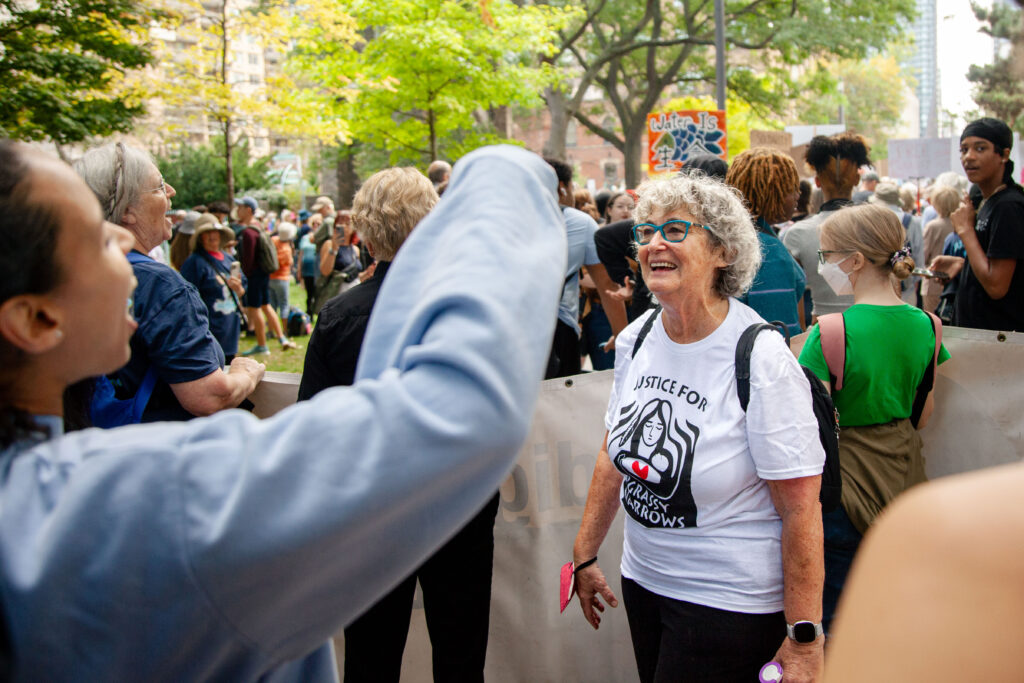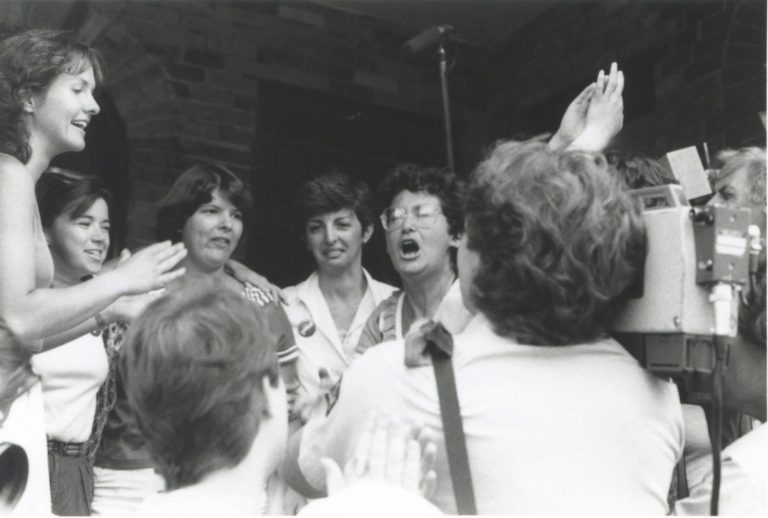Listen to the full story here:

Judy Rebick planned to retire last year from her post as a longtime lecturer at Toronto Metropolitan University (TMU) but the surge of protests around Israel’s war on Gaza prompted her to delay.
“I have a really strong political intuition, I feel things,” said Rebick, who has been teaching POL 601: Social Movements and Politics for decades — even after she stopped working full-time at the university in 2010.
Rebick, a long-time advocate for Palestinian liberation, says she planned to retire at the end of the spring 2024 semester but changed her mind last fall, after she says she noticed increased levels of engagement among students as a new wave of activism began snowballing — just as it did back when she was in school.
“I felt this was a very powerful movement, as powerful as the anti-Vietnam War movement,” she said.
As Rebick told what will now be her final cohort of students during their first lecture this semester, “This is the biggest wave of activism I’ve seen since the 60s.”
How Rebick got her start
Rebick says her political awakening began at McGill University, where she initially studied science — “because girls weren’t supposed to be good in science” — with plans to become a doctor. But a stint as a reporter at The McGill Daily led her to shift gears and begin engaging in political and social issues.
In 1970, Rebick traveled solo across South Asia and the Middle East— an experience that further shifted her worldview.
“It really radicalized me, because I understood the poverty of [developing nations] and that it was the fault of U.S. imperialism,” she said. “I could see it, feel it and know it.”
Upon returning home, Rebick was determined to get involved in community-led movements that addressed global and local inequalities.
In 1971, Rebick says she helped establish a tent city at the University of Toronto’s Hart House to provide shelter for youth in what she describes as a response to societal fears about the counterculture movement of the time. “We had yoga, we had rock bands, folk music and classes — like an open university,” said Rebick. When the university applied for an injunction, Rebick found herself thrust into the media spotlight.
“It was the first time my pictures were ever in the paper,” she said.
It wasn’t the last. In 1983, Rebick helped set up an illegal Toronto abortion clinic led by Dr. Henry Morgentaler. Rebick says it wasn’t until an incident at the clinic’s opening — when she pushed away a man lunging at Dr. Morgentaler with a pair of garden shears — that she became famous.
“They called me ‘that girl from the clip,’” she said.
A month after opening, police raided the clinic and Dr. Morgentaler was charged with conspiracy to procure a miscarriage. The case made its way to the Supreme Court and ultimately is credited with striking down Canada’s anti-abortion law in 1988, leading the medical procedure to be protected under the Charter of Rights and Freedoms.

In 1990, Rebick was elected president of the National Action Committee on the Status of Women, a job that further propelled her towards becoming a widely recognized feminist activist and in 2001, Rebick founded rabble.ca, a popular independent news site.
“All the staff at the beginning were women, including the webmaster — webmistress, we called her,” she said. “The web was so male-dominated.”
In 2002, Rebick was appointed as TMU’s inaugural Sam Gindin Chair in Social Justice and Democracy at TMU — a position she says was designed “to bring together academia and social movements.”
During her many years at the university, Rebick helped create an Anti-Racism Coalition, organize the first Toronto Social Forum and World Social Forum and developed an intensive course about social justice that evolved into one of the university’s core undergraduate selections.
Rebick will leave a “groundbreaking legacy,” said Winnie Ng, a former union organizer and scholar, who succeeded Rebick as Sam Gindin Chair and has known her since the early ‘90s.
“She hasn’t changed,” Ng said. “She’s a fearless and fierce advocate and activist, and she has this oratorical power in moving people to act.”
How student activism fuels Rebick
Rebick says she has been a firm advocate for Palestine since she spent two months in Israel as a young Jewish woman in 1970, back when she says she “didn’t even know the word Palestine.”
Nearly 40 years later, she was arrested outside the Israeli consulate on Bloor Street for protesting against the country’s occupation of the Gaza Strip. She also chaired a teach-in for Palestine at TMU last year.
In one of Rebick’s books, she includes a quote from a Leonard Cohen song, “There’s a crack in everything, that’s where the light gets in.”
“I think the light is the pro-Palestinian movement that we see,” Rebick said.
Though the fight for Palestinian liberation has been going on for over 100 years, Rebick says this is the strongest she’s seen the movement.
On Oct. 7, 2023, a Hamas attack killed 1,200 people along Gaza’s southern border and resulted in the kidnapping of around 250 others, according to Israel. Since October, Israel has responded with assaults that have killed over 41,000 Palestinians in the region, according to Al Jazeera — a military campaign that has been declared a genocide by international experts.
The ongoing war sparked responses from students worldwide, with Columbia University students making headlines in April for establishing a protest encampment. At TMU, students began organizing public actions, weeks of solidarity and petitions — one of which that prompted several donors to threaten withholding funding, according to the Toronto Star.
Rebick says she is confident the student movement will bring about “fundamental change” and be as “transformative” as the anti-war youth uprising of her generation.
“I hope they’ll become more active, or stay active,” she said.
Despite continuing to teach amid rising activism, this will be her final semester. Rebick feels this is the right time to step away, assured that the student movement will thrive. Turning 80 next year, she says she plans to continue traveling, public speaking and writing her next book, a memoir detailing her life as an activist.
One of Rebick’s final students is Iyland Monroe, who makes a point to sit front row at every lecture. “To be around someone like her is a once-in-a-lifetime chance,” she said.
On Sept. 18, Rebick took her class to a large demonstration in solidarity with Grassy Narrows First Nation amidst an ongoing mercury poisoning crisis. Marching next to Rebick made Monroe appreciate her real-world approach even more, she says.
Monroe says she felt silenced in her advocacy before Rebick’s class.
“Judy allowed me to not feel that way. That is a really, really big deal,” she said, “I’ll be following her wherever she goes.”
Kinza Zafar (she/her) is a reporter for OTR, Fall 2024.
